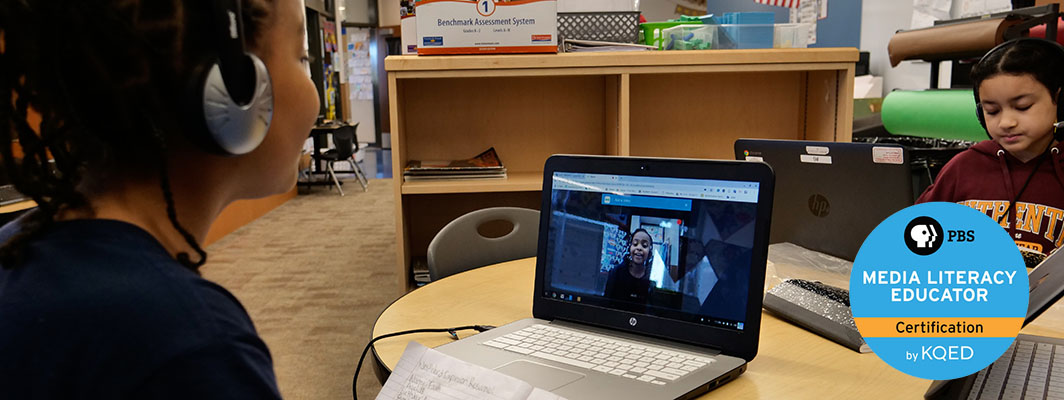
To thrive as content consumers and creators in an information age, media literacy is an essential skill set for both students and teachers. And the reality is that, from “fake news” to “deepfakes,” keeping up with the latest online apps, trends, and issues is an ongoing, ever-changing challenge.
As co-directors of the Elk Grove Unified School District’s digital citizenship program, Kathleen Watt and I are excited to spread the word about the PBS Media Literacy Educator Certification by KQED. To achieve certification, educators demonstrate their competency by earning eight micro-credentials from the KQED and PBS Media Literacy stack on the Digital Promise Micro-credentials Platform.
I first learned about this program, which is free and self-paced, at the CUE technology conference in March. The eight micro-credentials address relevant, timely topics and embrace individual teaching practices and technology integration choices.
Before getting started on the certification process, I had two questions for the PBS/KQED team:
After receiving a “Yes” to both questions, we got to work.
I truly enjoyed the process of putting together each submission. Kathleen and I have always known that our work with digital/global citizenship and media literacy was important, but the PBS/KQED micro-credentials validated and elevated it beyond district boundaries.
We started with the Evaluating Online Information micro-credential. As we reflected on our media literacy journey, it was exciting to see how our initial presentation, Media Literacy in a Post-Truth Era, which we first shared during a 2016 technology seminar for our district, has continued to evolve, with new resources and even a new title: Thinking Critically About the (Fake!!) News. I’ve since presented it two years running at California’s fall and spring CUE conferences, teaming with Common Sense Education. We are now looking forward to its debut as Hoaxes and Fakes, part of Common Sense’s new curriculum to be released for the 2019 school year.
Each micro-credential has served as a reason and opportunity to revisit our presentations, projects, and resources, and to consider updates and possible revisions. These shared discussions are a huge benefit in the micro-credential submission process. We appreciated that each micro-credential focused on a specific media literacy topic rather than on a software application or platform.
My first four submissions (Evaluating Online Information, Analyzing Media, Implementing Media Projects in Early Childhood, and Creating a Code of Conduct) were scored in less than 48 hours, with the good news that I had been awarded the four corresponding micro-credentials. The next four (Evaluating Online Tools for Classroom Use, Making Media for Classroom Use: Images, Graphics and Interactives, Making Media for Classroom Use: Audio and Video, Assessing Student Media) were also scored quickly—but the assessors highlighted areas where I had not fully addressed the questions or included sufficient examples, and I needed to resubmit my work.
Each time I resubmitted a micro-credential, I included more details in the reflections section of the application. Before resubmitting Making Media for Classroom Use: Audio and Video, for instance, the focus of our I’m Not Leaving lesson was a specific historical event. In reviewing the lesson, I realized we should incorporate a section to build students’ understanding of the role propaganda plays in shaping historical events and current events. We updated the lesson by adding an extension section, which includes a challenge from media literacy Professor Renee Hobbs to complete her Mind Over Media Challenge.
The micro-credential that posed the biggest challenge was Assessing Student Media. Four submissions later and thanks to input from students and a librarian at a nearby high school, I was awarded my eighth PBS/KQED Media Literacy micro-credential. I immediately emailed Rachel Roberson, KQED’s education news manager, to share the good news. Rachel told me I was the first person to earn all eight micro-credentials and was “truly a trailblazer.”
I’m proud to be a PBS/KQED “trailblazer” on the path to media literacy certification and look forward to supporting teachers in my district on their certification journeys. Each micro-credential is an opportunity to explore the many ways media literacy can and should be woven into the school day, across all subject areas.
Get started on your path to PBS Media Literacy Educator Certification with micro-credentials. Visit Digital Promise’s Micro-credentials Platform to learn more.